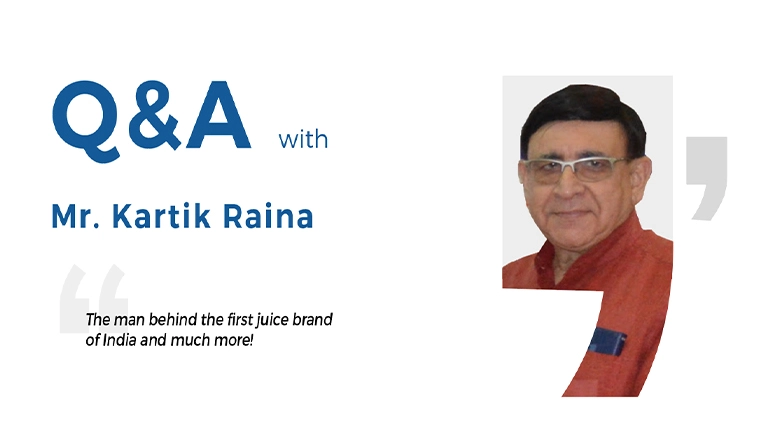Table of Contents
ToggleAn MBA from Jamnalal Bajaj Institute of Management Studies was just the stepping stone for Mr. Kartik Raina, who then held the helm for various national and international corporate setups, such as SmithKline Beecham Consumer HealthCare (now GlaxoSmithKline Consumer HealthCare), Dabur Foods & Excelcia, Hoechst Ltd (Nigeria), Bestfoods International (Unilever Bestfoods) Sri Lanka & Maldives, etc.
With a career spanning over decades, he has seen punching cards evolve into highly sophisticated integrations and has been at the core of numerous ground-breaking business strategies. Often attributed to the conception and launch of the first juice brand of India – Real Juice, Mr. Raina also teaches at some of the leading Management Institutes in Dubai, India, and Singapore.

Let’s check out a few glimpses from a heart-to-heart session with our team of young minds with Mr. Kartik Raina.
1. Over such an illustrious career, you have witnessed the evolution of the global FMCG sector. How do you feel it has evolved, in terms of consumer, technology, FMCG manufacturer mindsets, etc?
“I started my career from P&G in 1974, the data entry was still via Punching Cards, and the computer used to fit in a 20X15 room. All the sales data was punched by a person, printouts were generated on a large sheet of paper and if the data mismatched the manual records and estimates, the entire process was repeated.” (He laughs)
He also recalls using the very first computers in India, IBM 8286, in 1985 and the boot time spanning over half an hour or even more.
“With blazing fast internet, rapidly evolving business tech scene, and immensely powerful advanced data analytics capabilities, businesses in the FMCG sector have surely profited, especially the sales and marketing.
Today, you can track the agents, distribution outlets, SKUs and perform through market research. Later, the data can be fed to AI-powered analytics tools to get granular and actionable insights.
So, yes, the FMCG sector has surely come a long way!”
2. How has the pandemic affected or disrupted FMCG? What can FMCG brands learn from the success and failure stories of COVID-19?
“Yes, the pandemic was definitely a hiatus for the normal FMCG operations and business processes. There were many companies that said “pandemic hai, nahin hoga (Because of the pandemic, they cannot make profits) but then there are brands like Haldirams, that made massive profits with smart and innovative business strategies.
While the sales team knew that small impulse-eating packs will no longer have a similar amount of customers, they also knew that people will be sitting at home, with nothing much to do. They will enjoy their snacks. So, the brand introduced large family packs with new flavors and made their sales and marketing efforts more aggressive.
The brand made 2-digit crores in profits and now, as the restrictions are loosening up, they have reinstated the small packet production as well. There are many other examples, such as Byju’s that transformed online education and constructive engagement.
So, pandemic or no pandemic, you must know how to make the most of what you have.”
3. Being a corporate stalwart, you have seen trends come and go. How to induce a change in management in the highly reluctant corporate sector?
“Change is inevitable and the best way to react to it would be to be prepared for it. Be it industry disruptions, like the digital devices for sales agents, or be it any change in policies, you have to gear up for the same.”
“Let me give you an example from my personal life. A few months back, I started writing a book on sales and channel management. However, I realized down the process that today, young management stakeholders and young corporates will not even think of lifting a 450-page book, let alone read it.
So, you have to gear up (yourself and people), to accept the change and embrace it.
Just like the older hardware, the older policies and strategies will definitely cease to be relevant to the modern market and consumers.
4. What is the most fascinating innovation or aspect of the Indian FMCG sector, according to you, in your corporate journey?
“According to me, the most fascinating part of FMCG has always been the relationship building. No amount of digitization can replace the joy you experience while you nurture a relationship with your customers and colleagues.
How do you form and nurture these relationships is and always will be the most fascinating aspect for me, be it sales, marketing, or management.”
5. Wouldn’t it have been better to explore a new market with a new product, for example – the Southern States of India, instead of starting with Delhi?
“Well, then I would have been increasing my failure risks. When we launched Real Juice, we had no network, no loyal customer base, and no distributor in South India, and if you are planning to launch a new product or category, you cannot have all the elements going against you.
However, by the second year, we were there. Out of the top 35 cities for the Real Juice market, 8 were from South India, and Coimbatore was our biggest market in the South.”
He further says that positivity and inner exploration are extremely critical to the growth of a person. Negativity corrodes you from inside and you can either make things happen, watch others making things happen, or simply wonder what happened!
6. What do you have to say for the young workforce of FA? What according to you the future is about in SFA?
“I would recommend that now that you have all the right data tools, analytics, and business intelligence setup, you can now focus on how to make the FA team more effective with the data you generate.
Data is the operative word now, and it is essential for every person in the supply chain to realize that digital is not an option, it is the way of life!
FieldAssist has already forayed smartly into AI and ML-powered data analytics and business intelligence. A unified view of all the market, customer, and distributor data offers insightful views for every level of management.
And for the future roadmap, I suggest evolving as a training tool as well. You can start looking beyond data, for example, a field agent reporting a market problem and getting 4 resolutions to solve it in real-time. Make people realize that digital is the way of life.”
The delightful and immensely informative session ended with numerous takeaways and many enlightening examples to ponder upon.
This is the pilot offering from our series of “The Expert Talks”. Stay in touch for getting more insightful and mindful expert sessions with FA.
About Post Author
Rashmi Kapse
Rashmi is a Content Specialist at FieldAssist. After spending 11 years in the Executive Search business she decided to change tracks and follow her passion for writing. For the past 8 years, she has been writing on Sales Tech, HR Tech, FMCG, Consumer Goods, F&B and Health & Wellness.




